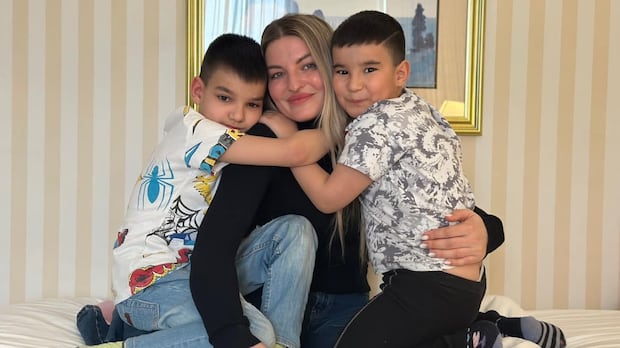Final rush of Ukrainians arrive in Nova Scotia ahead of emergency visa deadline
Ukrainian nationals have until March 31 to come to Canada
Iryna Lichna and her sons made it to Canada just in time.
The young Ukrainian family landed in Halifax less than two weeks before the deadline to use emergency visas issued under the Canada-Ukraine authorization for emergency travel program.
The program started after Russia's invasion of Ukraine in 2022, and allows Ukrainians to live, work and study in Canada for up to three years. Applications closed last summer, and anyone holding a visa has to use it by March 31.
As the deadline looms, Nova Scotia is experiencing a final spike in arrivals, including Lichna and her two boys, 10-year-old Samir and seven-year-old Saleem.
Difficult decision
They were approved under the emergency visa program a year ago, but Lichna said moving to Canada was only a backup plan at that time.
The single mother said a friend reminded her last month that the visa deadline was approaching and encouraged her to take the opportunity.
"Really, it was a difficult decision because I didn't have so much [money] saved, and I just took my kids' backpacks … and we came."

Since the war broke out, Lichna and her boys spent nearly two years living in Turkey, but she said they were only surviving there. She worked long hours for little pay and struggled to learn the language and culture.
Lichna moved her family back to Ukraine at the start of this year. She thought they would be safe in Chernivtsi, a city in western Ukraine, because of its distance from the front lines, but they still heard air raid sirens most days.
She realized, she said, "there is no safe place in Ukraine."
She was worried about being conscripted into military service because she's a doctor. She believes her boys would eventually be sent to fight if the war continued long enough.
"I don't want to tell the people who lost [their] lives it is for nothing. But this, the payment of protection of our land, is very high, high price. And I'm not ready to pay this by [the] lives of my kids."

Now she is one of more than 4,600 Ukrainians to have come to Nova Scotia in the past two years.
Ukrainians approved for Canada's emergency visa can go anywhere in the country and do not have to advise Ottawa or the provinces if or when they plan to arrive, so it's not possible to know how many more will come before March 31.
But aid organizations have been feeling the final rush of new arrivals. They're preparing for it to continue this week.
"We've seen larger numbers come out of uncertainty of what's going to happen in Ukraine, because they can always go back, I guess, if things get better. But after March 31, it would be difficult for them to come," said Rick Langille, founder of The Ukrainian Store.
Two years ago, The Ukrainian Store started as a donation centre in Dartmouth, N.S., collecting and distributing furniture to newly arrived Ukrainians.
Langille said it's grown into a community hub for Ukrainians.
"They share information, they help each other find work, they help each other find housing, they help each other get drivers' licenses, and they also have a lot in common … There's a bonding and a friendship aspect of it as well."
Langille said he expects donations to be in demand for at least a few more months as Ukrainians continue to get settled, but he expects the non–profit organization will keep operating even longer, shifting its focus to social support.
War still raging
Social support is a crucial part of Ukrainian settlement, said Lyubov Zhyznomirska, because many Ukrainians have fled to Canada without knowing anyone here.
Zhyznomirska is vice-president of the Ukrainian Canadian Congress' Nova Scotia branch.
She said it's important to note that although Canada's visa program is ending, the war in Ukraine is still raging.

"Ukrainians live with war every day and they continue to live with a war. So when we think about the number of arrivals, it's people who are escaping the war and instability and conflict in their country," said Zhyznomirska.
Lichna said she's worried the war will continue for years, so she's hoping to stay in Canada long term. Some days, she said the weight of building a new life is overwhelming, but she is trying to remain hopeful.
"When the war started, all my ambitions [were] destroyed," she said. "But still my spirit is not broken, and I'm ready to start from the beginning."


